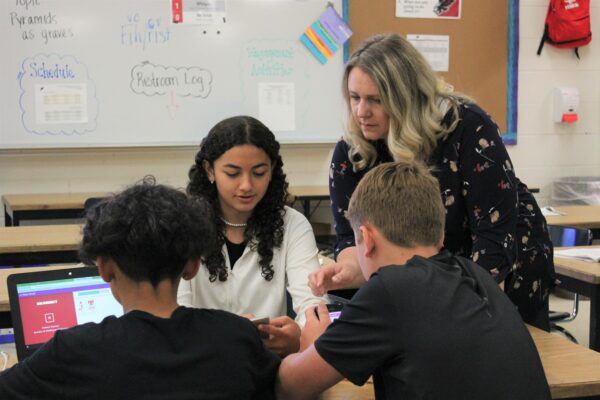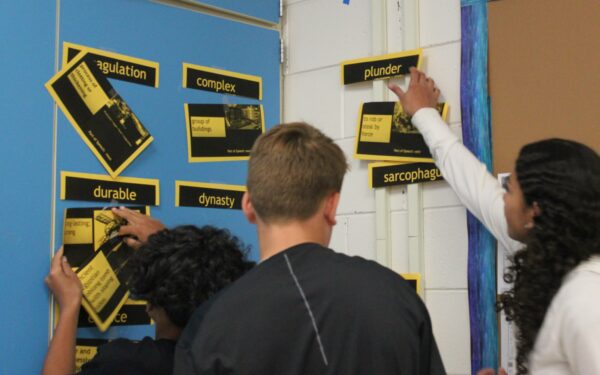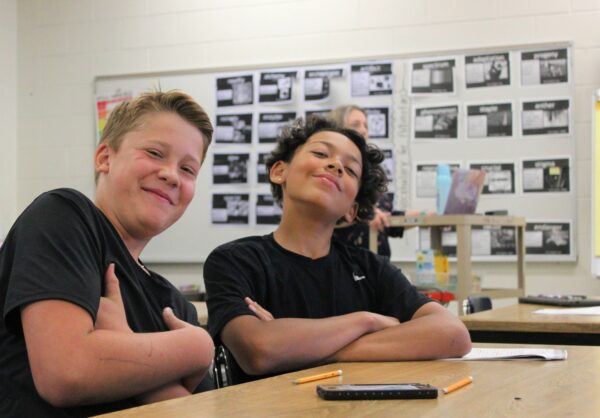
Melanie Franklin’s summer school class at Hanshew Middle School only had nine students in it on a recent Thursday morning, but it was action-packed.
The incoming sixth, seventh and eighth graders were seeing who could match vocabulary words and definitions the fastest. They ran across the room carrying yellow pieces of paper with definitions printed on them.
Franklin said games like these help the kids stay focused.
“This keeps them engaged, but they’re actually learning the vocabulary words,” she said.
Keeping kids engaged at summer school is especially important this year. The district administers benchmark assessments called MAP Growth tests each fall. Data shows that between Fall 2019 and Fall 2021, the median percentile rank on those assessments dropped by nine points for fifth graders, 11 points for sixth graders and nine for seventh graders.
Last year, the Anchorage School District ramped up summer programming in response to pandemic learning loss. It was the first time in several years they’d held intensive summer programs.
“Last summer, we were focusing on improving grades,” said Joe Zawodny, the district’s secondary education director. “This summer, we’re supporting students with specific reading and math learning needs.”

This year, nearly 8,000 students are enrolled. That includes 2,000 elementary schoolers, 1,000 middle schoolers and 3,500 high schoolers, plus a few hundred other students in special programs. Attendance varies, especially on Fridays, when many families go out of town for long weekends. Nearly 1,000 district employees are staffing the programs.
The district is offering both in-person and online classes for high schoolers. Secondary education director Marty Lang said that flexibility has proven helpful for many students. He said about half of high school students chose the online option.
“Summer in Alaska provides a lot of opportunities to be out and about and travel, so I think we’re increasingly seeing families who like that virtual option because it gives them flexibility,” he said. “We also see families who recognize that their student hasn’t been particularly successful online in the past and really needs that in-person connection with a teacher.”
The district is spending $7.6 million on summer programs. Funds come from federal COVID grants and money the district already had in its budget for summer programming. Deputy Superintendent Mark Stock said, in the fall, the district will compare math and reading scores of students who attended summer school and those who didn’t. That will help them decide whether the investment was worth it.
“If not, are we better off spending $7.6 million on after school tutoring during the school year?” he asked. “Because it’s a relatively major program we’re running.”
Stock said he’s hopeful the programs will both minimize the learning loss teachers see most summers – also called the “summer slide” – and the gaps they’ve seen during the pandemic.
“The pandemic loss is real, and it’s not going to come back in 21 days of summer school,” Stock said. “It’s going to take a concerted effort over time, and this is just one strategy.”
Teachers like Melanie Franklin are making that effort. Near the end of her class, she told her students to get out their laptops or phones to play an online vocabulary game. Scores got updated in real time on a big screen at the front of the class.
In the matching game earlier in the class, Jaedyn Hadley helped lead his team to victory. This time, one word proved to be a challenge: necropolis.
Still, he didn’t seem too discouraged. He kept playing and watched his score go up on the leaderboard with every answer he got right.





